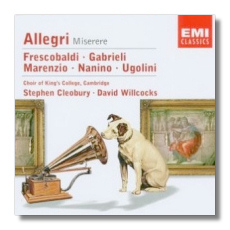
The Internet's Premier Classical Music Source
Related Links
- Latest Reviews
- More Reviews
-
By Composer
-
Collections
DVD & Blu-ray
Books
Concert Reviews
Articles/Interviews
Software
Audio
Search Amazon
Recommended Links
Site News
 CD Review
CD Review
Early Italian Sacred Music

- Gregorio Allegri: Miserere
- Giovanni Maria Nanino: Adoramus te, Christe
- Luca Marenzio: Magnificat
- Girolamo Frescobaldi: Messa sopra l'aria della Monica
- Vincenzo Ugolini: Beata es Virgo Maria
- Giovanni Gabrieli:
- Omnes gentes, plaudite minibus
- Magnum Mysterium
- Buccinate in Neomenia tuba
- Domine Jesu Christe
- Angelus ad Pastores ait
- Canzon Septimi Toni à 8
- Hodie completi sunt
- Hodie Christus natus est
Choir of King's College, Cambridge/Stephen Cleobury
Cambridge University Musical Society/David Willcocks
The Bach Choir/David Willcocks
Wilbraham Brass Soloists
EMI Classics 75878-2 DDD/ADD 76:43
Two separate LPs, one recorded in 1973 and the other in 1983, were conflated to create this well-filled budget CD in EMI Classics' "Encore' line. As an inexpensive introduction to the music of Giovanni Gabrieli, and the famous Allegri Miserere, it gives the listener his or her money's worth and then some.
The Gabrieli recital is the older of the two. Willcocks and his forces take a historically informed approach, but in no way do they attempt to approximate the sounds that the composer himself might have heard during the first decade of the 1600s. These performances might be thought of as a more refined alternative to Columbia's famous series of LPs (later transferred to CD, at least in part) with organist E. Power Biggs, the Gregg Smith Singers, the Texas Boys' Choir, and the Edward Tarr Brass Ensemble. The Columbia LPs were recorded "on location" in Venice, and are splendid documents of more naïve times. Contenting themselves with King's College Chapel in Cambridge, Willcocks's musicians adopt a similar performance style, but with a more blended sound and less drama. The choral singing is unmistakably English: precise, and emphasizing beauty of tone over dramatic interpretive flourishes.
The balance of the material was recorded by Cleobury early in the digital era. The more modern recording process, coupled with Cleobury's more detail-oriented conducting, results in cooler, less hazy performances. The stratospheric soloist in the Miserere is an actual boy. (The famous Tallis Scholars recording uses a young woman.) Particularly in this work, Cleobury takes a cautious approach, clarifying harmonies and (especially) rhythms obscured on other recordings. He thinks in notes more than in phrases. It's neither the most passionate nor the most pathetic performance on disc, but its heart is in the right place, and it is impeccably sung. The other material is relatively unfamiliar but worthwhile.
The booklet notes are sketchy, and no texts and translations are supplied. As this CD seems geared primarily to less experienced collectors, omitting material that would have facilitated the appreciation of this music wasn't a happy idea. Paradoxically, then, veteran collectors of this repertoire might find this disc more enjoyable.
Copyright © 2003, Raymond Tuttle


















